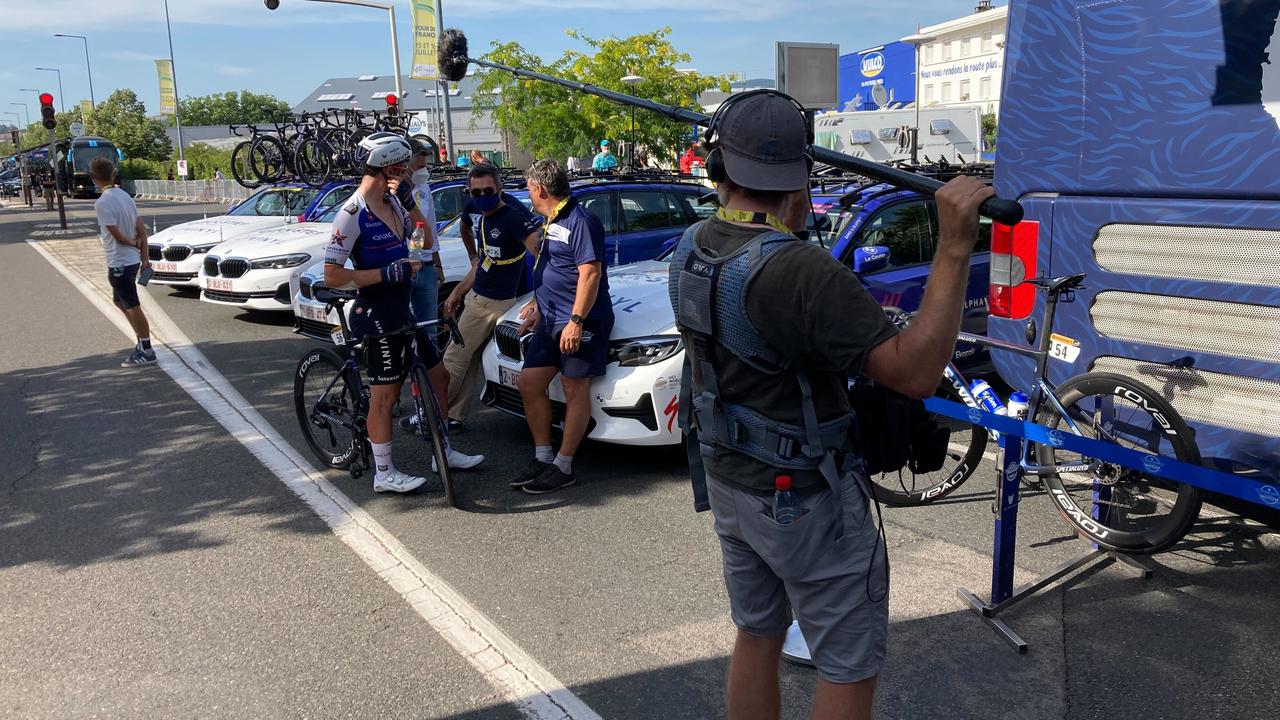During the Tour de France, eight teams are continuously followed by a film crew for a Netflix documentary which will be released next year. Cycling hopes with the eight-part series the impact of the popular Drive to survive on Formula 1.
Ralph Denk laughs when asked if his riders think it’s a problem that they are followed by a camera 24 hours a day during the Tour. “They also have an interest in this documentary being a success,” says the owner and team leader of BORA-hansgrohe in a conversation with NU.nl. “Because it could get them a higher salary in two or three years.”
Denk didn’t hesitate for a moment when he was offered the opportunity to play an important role with his team in the first Netflix series on the Tour. The German knows enough people in Formula 1 to know what such a documentary can bring to a sport.
Drive to survive, which is produced by the same company as the Tour series, has been giving a behind-the-scenes look at F1 since 2019. Three years on, everyone in motorsport’s premier class agrees it’s all about of unprecedented success. “Drive to survive “It’s had an incredible effect on our sport,” Formula 1 boss Stefano Domenicali said in March. “It’s brought us a lot of new fans, especially in the United States.”
A similar boost would be welcome for cycling. “We see this documentary as a great opportunity,” says Denk. “Not just for our team, but for the sport in general. If we take 50% of the success of Drive to survive can achieve, that’s already a fantastic result.”
The Tour series in brief
- Eight of the 22 teams take part in the series: Jumbo-Visma, AG2R, Alpecin-Fenix, BORA-hansgrohe, EF Education-EasyPost, Groupama-FDJ, INEOS Grenadiers and Quick-Step Alpha Vinyl.
- UAE Team Emirates, the team of defending champion Tadej Pogacar, declined the offer of cooperation. “Sometimes it can be dangerous to introduce something new,” director Andrea Agostini told VeloNews.
- The series is produced by Quadbox, a collaboration between French production company Quad and Box To Box Films, the producer of Drive to Survive.
- The series will consist of eight 45-minute episodes and will be released in the first half of 2023.
Jumbo-Visma has two film crews around it
Filming for the series began a few months ago. Three to four people are presented per team. These riders or staff members were visited at home before the Tour and followed closely during training camps and preparation races. During the Tour de France, the cameramen full access: they can come and be everywhere.
“So far they’ve been very respectful and not pushy at all,” said EF Education-EasyPost UK pilot Owain Doull. “Usually I don’t even realize they’re there. We also used to have cameras around us.”
This certainly applies to Jumbo-Visma pilots. The Dutch team already admitted a NOS team for the documentary in 2013 The Bauke Tower and has since opened its doors almost every year during the Tour de France. This summer, the team of yellow jersey wearer Jonas Vingegaard is working on two series: the Netflix documentary and All or nothingthe Amazon series which represented Manchester City and Tottenham Hotspur among others.
“Transparency. That’s why we’ve been making documentaries with the team for years,” says Jumbo-Visma managing director Richard Plugge. “And we want to show how our sport really works. We think that Netflix, from an outside perspective, is able to explain cycling well to a wider group of people. And open those people’s eyes and shows them how beautiful sport is.” .”
A sound engineer from the Netflix series surprises Quick-Step Alpha Vinyl pilot Yves Lampaert as soon as he arrives on the team bus after the thirteenth stage.

A sound engineer from the Netflix series surprises Quick-Step Alpha Vinyl pilot Yves Lampaert as soon as he arrives on the team bus after the thirteenth stage.
Photo: NU.nl/Daan de Ridder
Tour shares revenue with teams
Plugge also hopes the Netflix series will be the start of another – and more importantly – better – collaboration with the ASO. The Tour organizer makes a lot of money from the world’s biggest cycle race through TV rights and advertising revenue, but the teams see very little of it. The total prize money for this year’s Tour (2.282 million euros) is a fraction of the money ASO earns with the tour.
“The economic model of cycling is outdated,” said Belgian AG2R rider Oliver Naesen, who retired on Wednesday in the eleventh stage. “Our team boss, Vincent Lavenu, told me that it cost 150,000 euros for our team to participate in the Tour. There is no other sport in which participants have to pay such a sum for take care of the show. That might change.”
This change may have started, as the ASO shares half of the Netflix series revenue with the eight participating teams. “It’s an important signal that the ASO is willing to work with us on these types of projects and share the benefits,” said Plugge, who is also president of the AIGCP, the association of professional cycling teams. “At least it’s better than before: 100% one way and 0% the other.”
But in the end, the success of the series will mainly depend on the quality of the plots. “We need some controversy here and there, some stress,” Naesen says with a smile. “I think it could be a really good series. I really hope so because it would be great if Netflix could do for cycling what it did for Formula 1.”
You can find all the latest news and background in our Tour de France file
 DodoFinance Breaking News Made For You!
DodoFinance Breaking News Made For You!
